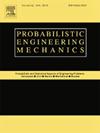基于物理信息高斯过程回归的随机动力系统可靠性评估
IF 3
3区 工程技术
Q2 ENGINEERING, MECHANICAL
引用次数: 0
摘要
动态可靠度函数(DRF)可以衡量随机动力系统在随机参数或激励下的全生命周期性能,是动态不确定性下基于可靠性的设计优化所需要的。为了构建一个高保真的预测模型,用于分析复杂动态系统并提高系统可靠性,本文提出了一种基于代理的新方法,利用物理信息高斯过程回归(PIGPR)。建立了两个基于PIGPR的框架,包括随机参数下时变可靠性的PIGPR结合蒙特卡罗仿真(PIGPR- mcs)和随机激励下第一通道可靠性的PIGPR结合第一通道可靠性(PIGPR- fp)。PIGPR-MCS采用PIGPR求解原始动力方程,并采用MCS求解DRF,而PIGPR- fp则直接采用PIGPR求解第一遍可靠性满足的后向Kolmogorov方程。与传统的基于代理的方法相比,本文提出的基于pigpr的框架通过将DRF中的物理规律嵌入到高斯过程的协方差函数中,可以处理不确定和有噪声的数据,更好地估计DRF及其不确定性。由于PIGPR可以有效地利用DRF的物理信息,因此可以有效地减少对标签样本的依赖,提高物理可解释性,数值算例很好地说明了这一点。通过两个工程实例,分别验证了PIGPR-MCS和PIGPR-FP的有效性和适用性。通过提出的PIGPR方法,可以有效地评价随机动力系统的安全程度。本文章由计算机程序翻译,如有差异,请以英文原文为准。
Reliability assessment of stochastic dynamical systems based on physics-informed gaussian process regression
The dynamic reliability function (DRF) can measure the performance of stochastic dynamic systems under random parameters or excitation in the whole life cycle, and it is required in the reliability-based design optimization under dynamic uncertainty. To construct a high-fidelity predictive model for analyzing complex dynamic systems and enhancing system reliability, a novel surrogate-based approach is proposed in this paper, leveraging physics-informed gaussian process regression (PIGPR). Two PIGPR-based frameworks are established, including PIGPR combined with Monte Carlo Simulation (PIGPR-MCS) for time-variant reliability under random parameters and PIGPR combined with first-passage (PIGPR-FP) for first-passage reliability under stochastic excitations. PIGPR-MCS applies PIGPR for the solution of the original dynamic equation and solves the DRF using MCS, while PIGPR-FP directly uses PIGPR to solve the backward Kolmogorov equation satisfied by the first-passage reliability. Compared with the traditional surrogate-based methods, the proposed PIGPR-based frameworks, by embedding the physical laws in DRF into the covariance function of Gaussian process, can handle uncertain and noisy data, offering better estimation of DRF as well as its uncertainty. Since PIGPR can effectively utilize the physical information of DRF, it effectively reduces the dependence on label samples and improve the physical interpretability, which is well illustrated by a numerical example. The effectiveness and applicability of the PIGPR-MCS and PIGPR-FP are demonstrated through two engineering examples, respectively. Through the proposed PIGPR approach, the safety degree of the stochastic dynamic systems can be efficiently evaluated.
求助全文
通过发布文献求助,成功后即可免费获取论文全文。
去求助
来源期刊

Probabilistic Engineering Mechanics
工程技术-工程:机械
CiteScore
3.80
自引率
15.40%
发文量
98
审稿时长
13.5 months
期刊介绍:
This journal provides a forum for scholarly work dealing primarily with probabilistic and statistical approaches to contemporary solid/structural and fluid mechanics problems encountered in diverse technical disciplines such as aerospace, civil, marine, mechanical, and nuclear engineering. The journal aims to maintain a healthy balance between general solution techniques and problem-specific results, encouraging a fruitful exchange of ideas among disparate engineering specialities.
 求助内容:
求助内容: 应助结果提醒方式:
应助结果提醒方式:


